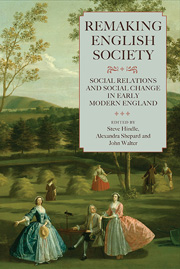Book contents
- Frontmatter
- Contents
- List of Illustrations, Figures, Maps and Tables
- Acknowledgements
- Notes on Contributors
- List of Abbreviations
- 1 The Making and Remaking of Early Modern English Social History
- 2 Brokering Fatherhood: Illegitimacy and Paternal Rights and Responsibilities in Early Modern England
- 3 Gender, Sexuality and the Consumption of Musical Culture in Eighteenth-Century London
- 4 Where was Mrs Turner? Governance and Gender in an Eighteenth-Century Village
- 5 Local Arithmetic: Information Cultures in Early Modern England
- 6 Intoxicants and the Early Modern City
- 7 Food, Drink and Social Distinction in Early Modern England
- 8 Written Obligations, Litigation and Neighbourliness, 1580–1680
- 9 Witchcraft and Neighbourliness in Early Modern England
- 10 Deference, Paternalism and Popular Memory in Early Modern England
- 11 Work, Reward and Labour Discipline in Late Seventeenth-Century England
- 12 Living in Poverty in Eighteenth-Century Terling
- 13 From Commonwealth to Public Opulence: The Redefinition of Wealth and Government in Early Modern Britain
- Appendix: Bibliography of the Published Writings of keith Wrightson from 1974 to 2011
- Index
- Tabula Gratulatoria
- STUDIES IN EARLY MODERN CULTURAL, POLITICAL AND SOCIAL HISTORY
5 - Local Arithmetic: Information Cultures in Early Modern England
Published online by Cambridge University Press: 05 May 2013
- Frontmatter
- Contents
- List of Illustrations, Figures, Maps and Tables
- Acknowledgements
- Notes on Contributors
- List of Abbreviations
- 1 The Making and Remaking of Early Modern English Social History
- 2 Brokering Fatherhood: Illegitimacy and Paternal Rights and Responsibilities in Early Modern England
- 3 Gender, Sexuality and the Consumption of Musical Culture in Eighteenth-Century London
- 4 Where was Mrs Turner? Governance and Gender in an Eighteenth-Century Village
- 5 Local Arithmetic: Information Cultures in Early Modern England
- 6 Intoxicants and the Early Modern City
- 7 Food, Drink and Social Distinction in Early Modern England
- 8 Written Obligations, Litigation and Neighbourliness, 1580–1680
- 9 Witchcraft and Neighbourliness in Early Modern England
- 10 Deference, Paternalism and Popular Memory in Early Modern England
- 11 Work, Reward and Labour Discipline in Late Seventeenth-Century England
- 12 Living in Poverty in Eighteenth-Century Terling
- 13 From Commonwealth to Public Opulence: The Redefinition of Wealth and Government in Early Modern Britain
- Appendix: Bibliography of the Published Writings of keith Wrightson from 1974 to 2011
- Index
- Tabula Gratulatoria
- STUDIES IN EARLY MODERN CULTURAL, POLITICAL AND SOCIAL HISTORY
Summary
Chester, 1626, and civic leaders had yet another problem to deal with. This time the cause was not a new wave of vagrants or unwelcome ‘strangers’ but one of their own. Gaps in the city records had come to light and the town clerk – Robert Brerewood – was the villain of the piece, although his ‘underclerkes’ also had to face the music. A string of complaints about ‘uncivel’ Brerewood claimed that he had been rude to a few mayors in a row and also to justices sitting at Chester's Quarter Sessions. He had not been doing his job by the book. In fact for three long years he had farmed out his ‘office’, lined his pockets, and created an administrative mess. Assembly orders had not been drawn up or written down in the book ever since he began to moonlight elsewhere, and names of juries went unrecorded. There was nothing left of the trust the city had once placed in its clerk. And to cap it all, word of new ‘abuses’ was brought to court: ‘Imperfect orders’ put down in records but not ‘agreed on by the assembly’; ‘accons’ entered ‘after a copie given out and baile put in by the defendant’; ‘a declaracon and a record’ both ‘razed’ and ‘altered’; a ‘judgement’ ‘blotted out’; another found after checking to be ‘wrongfull’. ‘[O]ther misdemeanors’ were not important enough to record but were important enough to ‘hinder’ justice and ‘dishonor’ the city. Troubled, aldermen looked through ‘bookes of orders of assembly’ and ‘records of perticular cases complained of’.
- Type
- Chapter
- Information
- Remaking English SocietySocial Relations and Social Change in Early Modern England, pp. 113 - 134Publisher: Boydell & BrewerPrint publication year: 2013

